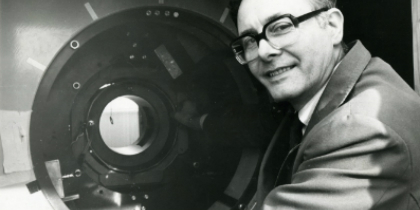
February 9, 2017, by Emma Lowry
Remembering founder of MRI and Nobel Prize winner, Professor Sir Peter Mansfield FRS (1933-2017)
Tributes have been paid to Nobel laureate Professor Sir Peter Mansfield, who has died at the age of 83.
Sir Peter pioneered the creation of Magnetic Resonance Imaging (MRI), one of the most important and revolutionary breakthroughs in modern medical science.
He was awarded the Nobel Prize for Physiology or Medicine in 2003 for his role in the development of MRI, which is used today in research, diagnosis and the treatment of millions of patients around the world.
The Sir Peter Mansfield Imaging Centre at The University of Nottingham was named in honour of his pioneering work to change the face of modern medical science.
Sir Peter’s invention of an extremely fast scanning MRI technique, known as echo-planar imaging (EPI), underpins the most sophisticated MRI applications in clinical use today. EPI is the key to functional MRI (fMRI), which is used to study dynamic processes in living organisms. Before EPI, fMRI was slow and hard to use clinically. EPI speeded up image acquisition and therefore underpins all modern fMRI applications.
MRI and fMRI have transformed neuroscience and physiology research by opening windows on the working brain and body. MRI provides detailed images of anatomical structure and can detect cancer and signs of damage in the body’s bones, tissues and organs. fMRI allows doctors to study brain activity during development, following injury and in brain disorders. It has also been used to investigate how the brain’s neural networks develop during infancy, and to look for subtle abnormalities in brain activity in patients with disorders including attention deficit hyperactivity disorder, schizophrenia and Alzheimer’s disease.
Sir Peter is survived by his wife, Lady Mansfield, his two daughters and four grandchildren
The University has set up an online book of condolence in tribute to Sir Peter.
- Sir Peter Mansfield and the original MRI trials
- Sir Peter Mansfield and team and the original MRI trials
- Sir Peter Mansfield in 1994
- Former Prime Minister Margaret Thatcher, Sir Peter Mansfield and Sir Colin Campbell (former Vice Chancellor of The University of Nottingham)
- Sir Peter Mansfield wins the Medical Research Council Millenium Medal
- Sir Peter Mansfield is awarded The Nobel Prize in Physiology or Medicine 2003
- Sir Peter Mansfield receives honorary degree from The University of Nottingham
- Sir Peter Mansfield wins Lifetime Achievement Award at the Times Higher Education Awards 2007
- Sir Peter Mansfield with the MRI scanner as it looks today
- Sir Peter Mansfield launches the Nottingham tram named in his honour
- Sir Peter Mansfield and University of Nottingham Vice-Chancellor, Sir David Greenaway at the tram naming ceremony
- Book signing at the MRI anniversary event held January 2017 at The University of Nottingham
No comments yet, fill out a comment to be the first

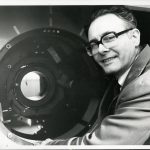
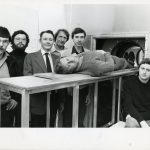
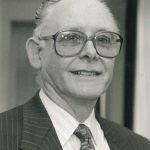
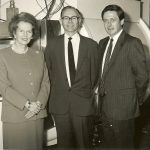
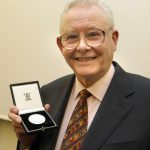

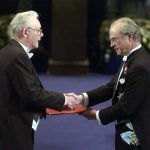
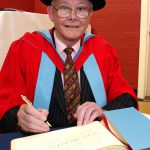

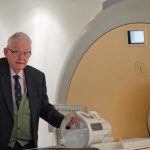


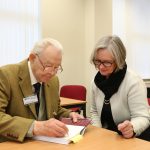
Leave a Reply